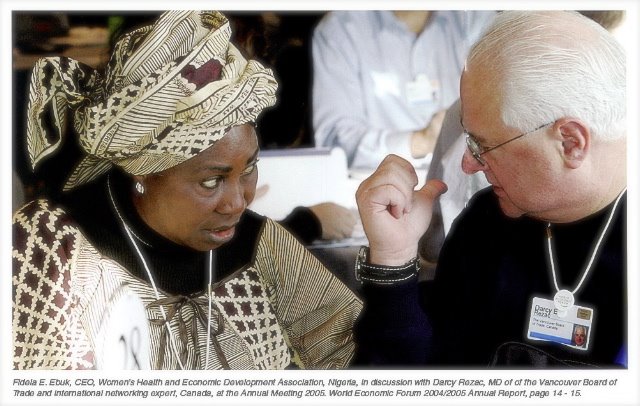Google Alerts are a wonderful thing, it keeps you informed of who is talking about you (maybe not good for Tiger) and where you have made a difference. This was a recent Google Alert from a company, Certes, who put a big focus on networking. http://www.certespros.com/ Here's what they say about WORK THE POND! The Shepa Learning Company's positive "networking 101 bible, we highly recommend this quick and clever read for those of you who plan to only purchase one networking how-to guide in your lifetime. As the authors themselves assert, this is not a book about getting leads, referrals, and contacts but about incorporating a service oriented philosophy into building better relationships for long-term success." http://www.nextworking.com/tips_and_links.cfm
Thursday, December 24, 2009
Global survey reveals happiness gaps between men and women - FP Posted
Why smiling can make you happier.
Posted: December 23, 2009, 5:56 AM by Ray Williams
By Ray B. Williams
Do you smile because you're happy, or does smiling make you happy?
In psychology, there is a theory called the "facial feedback hypothesis" which states, according to researchers D.A. Bernstein and his colleagues, that involuntary facial movements provide sufficient peripheral information to drive emotional experiences. Psychologists S. F. Davis and J.J. Palladindo explain that feedback from facial expression affects emotional expression and behavior. In simple terms, if you smile, you can actually improve your emotional mood.
R.B. Zajonc and his colleagues, reporting their research findings in the Psychological Review, found compelling evidence that smiling causes people to feel happy, regardless of how they felt at first. The researchers report that smiling leads to physiological changes in the brain that cool the blood, which in turn makes people feel happy. Researchers at the University of Munich studied subjects that had received botox treatments to their face. They found those subjects who had received botox treatments, when asked to either make an unhappy, neutral or relaxed face, reported more facial pain than subjects without botox treatments. These findings parallel the brain science research on mirror neurons, which show how mimicking the emotions, such as empathy toward another person can cause you to feel empathy. Studies by Robert Sutton at Stanford University have also shown that a smiling happy disposition by managers has a beneficial impact on employees and their work performance.
The research seems to give a partial answer to the chicken and egg question: do you smile because you're happy, or does smiling make you happy or happier? The research seems to point to increasing evidence of the mind-body connection. Michael Lewis, one of the authors of a research study on the subject at the University of Cardiff, concluded that our emotions are not just restricted to our brains, and there are parts of our bodies, such as our face, which has a large number of muscles, that help and reinforce the feelings we're having.
So the next time you want to feel happier, smile. Your brain and your face know what they're doing.
Ray B. Williams is Co-Founder of Success IQ University and Ray Williams Associates, companies located in Vancouver and Phoenix, providing leadership training, personal growth and executive coaching services. www.successiqu.com.
The Financial Post is now on Facebook. Join our fan community today.--
Darcy Rezac
www.boardoftrade.com
604 641-1255
Sunday, December 13, 2009
DISPATCHES BY VANCOUVER BOARD OF TRADE IN COPENHAGEN: Appleton Reports...
Copenhagen – December 11, 2009 - Canada continues to be the object of intense reflection at the global Climate Change talks in Copenhagen. A day does not go by without a protest about the environmental effects of Canadian extraction of petroleum from the Oil Sands. Today about 60 Canadian First Nations members paraded through the talks chanting to aboriginal drums while carrying placards demanding an end to oil sands extraction.
These demonstrations have built on an ongoing problem caused by Canada’s failure to implement the Kyoto Protocol, despite its signature on the treaty. While most G8 countries failed to meet their Kyoto Protocol objectives, Canada alone is the only G8 country to have signed Kyoto but then entirely failed to carry out any of its provisions.
The reputation of Canadians in these talks has taken a serious beating. Across the conference, there has been widespread disdain for the Canadian position. Concerns about the Canadian failure to meet its obligations has been expressed by NGO bloggers and senior conference leaders alike. It is clear that Canada’s previously reputation for building international institutions has been stained.
Canadians have often been able to feel good abroad based on their international reputation. The Copenhagen talks mark the first time that Canadians have not been able to rely on that reputation. Indeed, in light of the Obama Administrations adoption of more climate-change friendly policies, the Canadians are now seen as the villains at the Copenhagen talks. One conference leader source stated that he simply could not understand how Canada could rehabilitate itself without a major and well-publicized volte face by Canadian Prime Minister Harper at the Copenhagen Climate Change talks next week.
______________________________________
Barry Appleton
Managing Partner
Appleton & Associates International Lawyers
Toronto ~ Washington DC and
Special Representative and Foreign Correspondent
The Vancouver Board of Trade, Washington DC
Toronto Ph: 416.966.8800 Fax: 416.966.8801
77 Bloor Street West, 18th Floor,
Toronto, Ontario M5S 1M2
On the Web: www.appletonlaw.com
Email: bappleton@appletonlaw.com
Special Representative and Foreign Correspondent
The Vancouver Board of Trade, Washington DC
Toronto Ph: 416.966.8800 Fax: 416.966.8801
77 Bloor Street West, 18th Floor,
Toronto, Ontario M5S 1M2
On the Web: www.appletonlaw.com
Email: bappleton@appletonlaw.com
_______________________________________
Saturday, December 12, 2009
FLASH! VBT's Appleton Reports Seismic News from Copenhagen Dec 13...Disruptions Continue
Small islands Shake UP Copenhagen UN Summit
by Barry Appleton

The costs for islands like Tuvalu are very real. It is a small island nation that has very real concerns for its very survival. Islands like Tuvalu have suffered a staggering loss of fisheries and the health of its coral reefs are at peril caused directly by climate change. Other islands like the Maldives threatened to be submerged if global sea levels rise.
The position of the small island nations at the Copenhagen talks demonstrates an evolution in negotiations. It marks the first split in the power of the developing states. Styled as the G77, the developing states have wielded tremendous negotiating clout at international climate conferences on account of their impressive membership – comprising nearly one half of the 193 countries at the Conference. This time the G77 have been joined by China – resulting in an even more powerful economic and political force.
Yet the Small Island Nations proposal has resulted in a split in the G77. This is the first time that there has been a public split in this voting bloc – but perhaps the split was inevitable. The interests of the largest members of the G77, China and India, have differed from most of the other less industrialized members of the group. Industrialized developing countries have been concerned about the costs of actually obtaining emission cuts in their own countries –something that was not required of them under the lenient terms of the Kyoto Protocol. China is now the world’s largest emitter of carbon. When it is added to the G77, the split between the two largest developing states and the others becomes pronounced and clear. The interests of “CHININDIA” are very different from the majority of the G77.
The climate change protestors and the island nation of Tuvalu want a mandatory and meaningful climate treaty. China, India and the developed states do not. So goes Tuvalu, so goes these talks.
The Tuvalu proposal is also interesting as it has relied on a technical element of the existing Kyoto Protocol to amend it instead of creating a new treaty from the Copenhagen Conference. The amendment proposal requires that a vote be held at the Cop15 talks – something in itself that is very rare at such international conferences.
Tuvalu has identified previously unseen seismic faults lurking beneath the G77 coalition. The Tuvalu proposal is much more significant than any number of protests or placards. So the quakes caused by tiny Tuvalu may well result in a virtual tsunami at these talks. Through its actions, it is threatening to cause a highly divisive vote at the climate talks that may cause China to reconsider its new-found embrace of emission reductions.
Stay tuned on this developing story.
______________________________________
Barry Appleton
Managing Partner
Appleton & Associates International Lawyers
Toronto ~ Washington DC
And, Vancouver Board of Trade Special Represenative, Wahington DC
Toronto Ph: 416.966.8800 Fax: 416.966.8801
77 Bloor Street West, 18th Floor,
Toronto, Ontario M5S 1M2
On the Web: www.appletonlaw.com
Email: bappleton@appletonlaw.com
And, Vancouver Board of Trade Special Represenative, Wahington DC
Toronto Ph: 416.966.8800 Fax: 416.966.8801
77 Bloor Street West, 18th Floor,
Toronto, Ontario M5S 1M2
On the Web: www.appletonlaw.com
Email: bappleton@appletonlaw.com
COPENHAGEN 12 DEC: VBT's Appleton reports on World Economic Forum Young Global Leaders Meeting.
by Barry Appleton
Copenhagen, December 12, 2009. The World Economic Forum's Young Global Leader's held a private think tank like meeting with officials and advisors to discuss prospects for the negotiations. About twenty young global leaders convened at the talks to find ways to better understand climate change in the context of the current talks. An eclectic mix of attendees at the event included an acclaimed industrial designer, an alternative energy expert, an acclaimed National Geographic Society photographer, an international law expert, a carbon-neutral rose grower from Ecuador, an indigenous peoples leader from Indonesia and the Crown Prince of Denmark. Three Canadians attended.
Former United Nations Under-Secretary General Maurice Strong offered some frank views. He believes that the state of the talks cannot result in a truly successful and meaningful deal. Mr. Strong, a Canadian who chaired the ground-breaking 1992 UN's Earth Summit Climate Change Conference, the only workable deal can be a legally-binding mandatory one. And for him, it is clear that the political will is simply not present to get such a deal at this time. Advisors to the governments of the United States and India told the Young Global Leaders in their off-the-record sessions that a political deal is the best deal that can be achieved during the Copenhagen talks.Jose Maria Figures, a former Costa Rican President who was elected on an environmental platform, believed that having some political deal would be better than no deal at all. Mr. Figures, a Former CEO of the World Economic Forum, suggested that steps towards a non-mandatory climate change agreement (a political deal) could result in environmental benefits that could result in a mandatory deal being reached in future. He advised the Young Global Leaders to find ways to assist governments attending the talks to find political support towards the tough domestic political decisions necessary to make any binding deal work. Strong stressed the need for a way to make the best out failure at these talks through an interim agreement to get negotiators towards a fuller agreement later. But there are costs to this approach. In his view, business leaders will likely withhold the types of meaningful climate change investments necessary to address global warming without a binding and mandatory agreement.The Climate Changes talks will continue for one more week. President Barrack Obama will participate Thursday and is expected to try to salvage a deal.
__________________________________________________________
Barry Appleton, Managing Partner
Appleton & Associates, International Lawyers
__________________________________________________________
Barry Appleton, Managing Partner
Appleton & Associates, International Lawyers
Subscribe to:
Comments (Atom)






